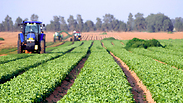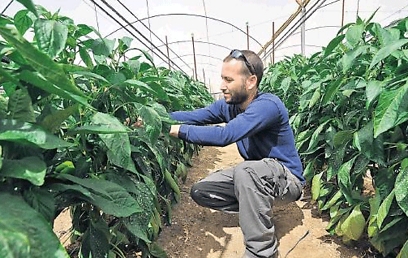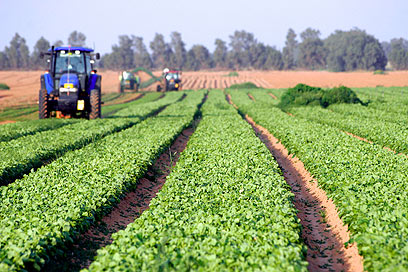
Where have all the farmers gone?
Israeli agriculture is in serious decline – 75 percent of the country’s farmers have vanished over the past 30 years, amid accusations of neglect and even profiteering by the government.
Israel loves to take pride in its agricultural achievements. The technology employed here, after all, is viewed as the most sophisticated in the world; the ability to produce more under less-favorable conditions is remarkable; and revenue from agriculture totals almost NIS 2 billion a year. Add to this the fact that Israelis are the biggest consumers of fruit and vegetables in the world, and you are left with a recipe for success.
But there are losers, too, in this story; and regrettably and surprisingly so, they are the ones without whom the chain wouldn't exist – the farmers. And if the state – or the government in other words – doesn't wake up soon, we may well be left within just a few years with nothing to be proud of aside from the technology.
Over the past three decades, the number of farmers in Israel has been slashed by more than 75 percent – from 40,000 to less than 10,000 (figures from the Israel Farmers Association show some 13,000 farms in Israel in all branches of agriculture, but the number is lower in the field). And the situation has deteriorated over the past three years. In the past year alone, dozens of farmers in the Arava region have abandoned their greenhouses, and several were forced to declare bankruptcy and lost everything.
This change may indeed be part of a global trend; but whereas in other places around the world, governments are stepping in to save their countries' farmers, the state in Israel offers indirect assistance that only goes to strengthen the large corporations, which themselves are an integral part of the problem.
"From being a country that takes pride in its agriculture and nurtures it, we've become a country that is throwing its farmers under the wheels of the tractors," says one young farmer from the south.
"There've been numerous reforms, but nearly all of them center on technological improvements and boosting productivity, and not the people themselves, the farmers. It's high time the government realized that there aren't any robots to replace the farmers; and without people, no amount of improved efficiency is going to help."
And who keeps turning a profit?
Many of the farmers we spoke with chose to remain anonymous, citing fears that the banks could refuse in the future to provide them with loans and thereby ruin them completely. "If they were to see that our situation is dire, they'd refuse to help us and then we'd go bankrupt like many of our friends did," one woman said. "We still believe that we'll get out of it; but if we go through one more year like the past years, we, too, will become one of the statistics."
Take for example one moshav in the south that will also remain nameless as requested. There, 60 out of around 400 farmers packed up and left within the space of a year, and many others are looking for a way out.
"These are people who have nowhere to go," says Oren, a veteran farmer from the south. "Another year or two like the past few years and all the communities will simply disappear from here – and remember, we lie along the border. No one will come here to replace us. I'm no longer a child; and if the coming year isn't a good one, I will leave too. I've already lost all I had, and the next stage is to lose my house, which I have mortgaged for the sake of the business."
A number of factors are to blame for the crisis in the field of agriculture. It begins with the streamlining of the industry, a global trend in the framework of which a fewer number of farmers are able to yield more produce and work larger areas of land. In this area, everyone concedes, there's not much at all to be done.
But Israel has additional problems – production costs are particularly high; the various corporations – from the marketing chains and through to the seed and shoot producers and carton makers – squeeze the farmers; competition is problematic; the markups are insane; taxes are high; and government support is scant. And on top of it all, three tough years weather-wise have affected quantities; European groups have been boycotting Israeli produce; and the Israeli economy has provided additional unique difficulties.
"You need to understand, one measly kilo of peppers has to support pesticide companies, all the water and irrigation equipment companies, the seed companies, shoot companies, transportation companies, carton makers, the customs department," explains one of Israel's largest farmers.
"For the past three years, nothing's been moving; but apart from the farmers, everyone else is still earning their share. Why? Because they're strong and they can. We're dealing with cartels for all intents and purposes, and it is very hard to fight them."
These corporations are an integral part of the dark side of the globalization and capitalism: Too much power lies in the hands of too few people. Thus, the marketing chains can buy fruit and vegetables from the farmer at a minimum cost, and then to sell to the consumer at exaggerated prices; and thus, the various companies can exact high prices from the farmers because there is no alternative – and the weak farmers have no bargaining power.
"The state, too, shares a significant portion of the blame for the fact that many farmers have become leaseholders on their land for the wealthy," says MK Zevulun Kalfa (Habayit Hayehudi), who chairs the Knesset's agricultural lobby. "This unfortunately is the reality that has been fostered in recent years, granting too much power to the marketers and marketing chains and wholesalers on the one hand, and weakening the farmers and consumers on the other.
"A few months ago, I submitted a law proposal designed to reduce the markups in the agricultural field and thus deal with the piggish phenomenon of the marketing margins in the framework of which the farmers receive very low prices for their produce yet the goods are sold to the public at high and often unreasonable ones," Kalfa says.
"A few years ago, we, a number of farmers, set up a company of sorts," Oren relates. "We approached one of the companies and informed them that we were not prepared to pay more than NIS 2.5 per carton. The price suddenly dropped to NIS 1.7 per carton. And they are still turning a nice profit. It happens with all the companies, in all fields. When the agricultural industry was booming, it was very convenient because everyone was winning. But the last few years have been very tough, and farms are folding one after the other. The banks see us as an entity at risk; they're afraid to give us loans – and it's like a snowball that's very hard to stop."
Living in the dark
Moshav Paran resident Karmit Mashiach, who along with Jacko Schifman is heading a social initiative among farmers that has given rise to the so-called Peppers Protest, tries to be less biting in her criticism and more optimistic, but her bottom line is much the same. "The small farmers are simply no match for the large chains," she says.
"A farmer who wants to sell his produce at a chain store must first come up with a fee of 28-32 percent – of the price paid to farmer, not of the final selling price – just to get through the door. Add to this the packaging and transportation costs, and there's a good chance the farmer ends up with a loss."
At the same time, Mashiach adds, the market has been opened to imports. Agriculture Ministry officials say the market is always open, and stocks are filled only in cases of shortages. "The question is who determines the shortages," she wonders out loud. "I'm not sure I know the answer to that one, but I don't see any shortage of fruit or vegetables out in the field."
When it comes to produce for export, the farmers say, the situation is a simple one: Cultivating peppers costs about NIS 35,000 per dunam of land; in recent years, however, the revenue from sales has stood at just NIS 32,000 – and this means a certain loss, which accumulates into hefty debts.
"The state doesn't help, and sometimes makes things more difficult," Oren says. "Take for example the employers' tax, which amounts to 16 percent of the wages of every worker every month. Last year, I paid NIS 750,000 in employers' taxes. For what?"
The exporters also pay a 7 percent tax in Europe ("that the Foreign Ministry could help to abolish or reduce by means of treaties," Oren charges), 7 percent to the marketing chains and another 1.5 percent to the Plants Production and Marketing Board.
"And in Israel, unlike in other countries, the field of agriculture receives barely any incentive grants or reimbursements," Oren continues. "We turn over hundreds of millions of shekels and it all goes into the state coffers, and the state isn't able to show its worth and declare agriculture a national interest."
The markups and marketing margins are a significant part of the problem; and in an effort to bypass them, Mashiach and her fellow farmers have started marketing directly from their greenhouses to the consumer. For now, things are going great, and they have plans to go countrywide.
"We are caught up in an absurd situation in which the farmer isn't the one who determines how much he gets for his produce," says Mashiach, who lives on Paran with her husband, Amir. They are both former hi-tech workers who left their jobs to take up farming.
"The farmer also plants without knowing the precise needs of the market, works the land, irrigates, fertilizes, harvests, sorts, washes, packs and transports his produce at his own expense," Mashiach says.
"And he only learns a few weeks later how much he will get for his produce and if it was all worthwhile in the end. The farmers need to unite to have more bargaining power, and we want to help the small farmers through our organization, which will promote common objectives."
One of the problems, Mashiach adds, is the infamous year 2007. That year, Spain, one of Israel's biggest competitors in the pepper exports market, suffered a severe blow when pesticide remains were found in vegetables originating from there. Pepper growers in Israel took full advantage of the opportunity, raised prices, and earned outrageous profits in one fell swoop. In the wake of the success, more and more farmers began growing peppers rather than other vegetables, and the second and third generations joined in. And then came several bad years, and the tables were turned.
Hemi Barkan, the coordinator of the Upper Arava Agricultural Committee, notes that the devaluation in the dollar has also come as a harsh blow to the farmers. "It has caused us to lose at least one shekel per kilo of exports," he says. "And add to that the fall-off of about one ton of produce per dunam due to weather issues. This is devastating from an agricultural perspective."
So what's the solution?
"We're trying," Barkan says, "by means of research and development, to introduce new crops – different vegetables, fruit orchards. In general, we're hoping that the coming years will be better, but the industry is clearly shrinking. Farmers who can cope will survive, and others will seek other sources of livelihood. But in any event, we expect the state to offer much more support for agriculture."
‘There'll be an intifada here’
And while we're on the subject of support, Israel is lagging far behind. Figures show that government support in relation to the country's agricultural yield is among the lowest in the world – one-third of the state support in Iceland, almost one-quarter of the support offered in Japan, Korea, Norway and Switzerland, less than in Turkey, and less, too, than the average in the European Union and OECD. The figures are astounding when seen in the light of the revenues yielded by agriculture in Israel – almost NIS 2 billion a year, with minimal use of resources such as land and water.
The same figures indicate that Israel is a world leader when it comes to the consumption of fruit and vegetables, by a long shot – a yearly average of 193 kilograms of vegetables per capita, as opposed to an average of just 118 kilograms per person in the EU and 123 kilograms in the United States; Israelis also consume around 190 kilograms of fruit per capita every year, as opposed to 103 kilograms in Europe and 111 kilos in the US.
Meir Tsur, the chairman of both the Israel Farmers Association and the Moshav Movement, says that the political situation also adds to the difficulties facing the farmers.
"When the Europeans want to boycott Israel, it always starts with the agriculture – the dates, the peppers, the mangos, the Israeli oranges," Tsur says. "And another issue that not many are happy to speak about is the matter of kashrut, which costs us 8 percent of the value of the product. That's a money-making industry based on extorting the public."
The religious angle made the headlines last weekend, when it emerged that for the first time since the establishment of the state, the Defense Ministry will not be purchasing produce from Israeli farmers and will be buying imported produce only – due to the shmita year, during which the land is left to lie fallow.
"For 150 years, a heter mechira, a sales permit, was in effect in Israel – from the days of Shmuel Mohilever and Rabbi Kook," Tsur says. "But today's army rabbinate is obviously primitive, and the Defense Ministry is impervious. It's a massive blow for us. We're talking about a client of NIS 300 million year for Israel's agricultural industry, and this money will now go to the Jordanians, the Gazans and countries in Europe."
Oren adopts an even harsher line. "The story with the Defense Ministry is cause for civil rebellion," he says. "We'll take to the roads with our plows. There'll be an intifada here. It's scandalous that no one has stood up and told them to f**k off."












